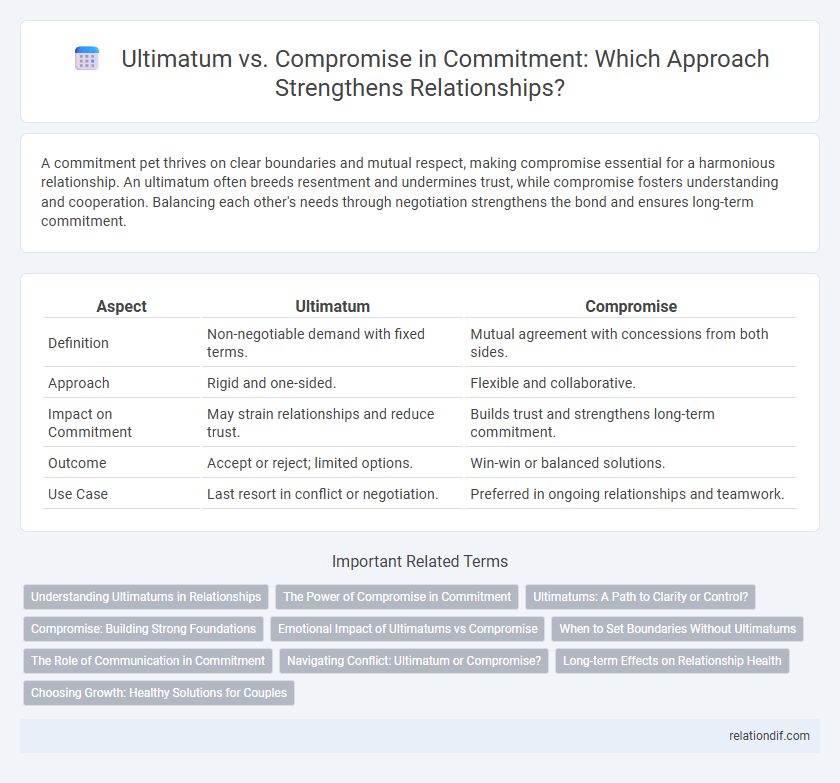A commitment pet thrives on clear boundaries and mutual respect, making compromise essential for a harmonious relationship. An ultimatum often breeds resentment and undermines trust, while compromise fosters understanding and cooperation. Balancing each other's needs through negotiation strengthens the bond and ensures long-term commitment.
Table of Comparison
| Aspect | Ultimatum | Compromise |
|---|---|---|
| Definition | Non-negotiable demand with fixed terms. | Mutual agreement with concessions from both sides. |
| Approach | Rigid and one-sided. | Flexible and collaborative. |
| Impact on Commitment | May strain relationships and reduce trust. | Builds trust and strengthens long-term commitment. |
| Outcome | Accept or reject; limited options. | Win-win or balanced solutions. |
| Use Case | Last resort in conflict or negotiation. | Preferred in ongoing relationships and teamwork. |
Understanding Ultimatums in Relationships
Ultimatums in relationships often signal a critical test of commitment, where one partner demands a specific action or change with the threat of ending the relationship if unmet. Understanding ultimatums involves recognizing their potential to create pressure and resentment, undermining open communication and mutual respect. Effective commitment thrives on compromise, where partners negotiate needs and boundaries collaboratively rather than resorting to rigid demands.
The Power of Compromise in Commitment
Compromise strengthens commitment by fostering mutual understanding and respect, creating a foundation for lasting relationships. Unlike ultimatums that impose rigid demands, compromise encourages collaboration and flexible problem-solving, which increases trust and emotional investment. This balance between individual needs and shared goals drives deeper connection and sustainable commitment.
Ultimatums: A Path to Clarity or Control?
Ultimatums often serve as a clear boundary that defines non-negotiable terms in a commitment, forcing a decisive outcome that can prevent prolonged uncertainty. While they may establish control and clarity by setting firm expectations, ultimatums risk undermining trust and open communication if perceived as coercive or inflexible. Understanding when to employ ultimatums versus seeking compromise is crucial for maintaining healthy, resilient commitments.
Compromise: Building Strong Foundations
Compromise fosters stronger relationships by encouraging mutual understanding and respect, which ultimately enhances commitment. Through open communication and willingness to adjust expectations, partners create a balanced foundation that supports long-term collaboration. This approach reduces conflicts and builds trust, essential for sustained commitment in personal and professional relationships.
Emotional Impact of Ultimatums vs Compromise
Ultimatums often trigger defensive reactions and emotional distress, undermining trust and open communication in relationships. Compromise fosters mutual understanding and respect, promoting emotional security and strengthening commitment bonds. The emotional impact of compromise supports long-term relational stability, whereas ultimatums tend to escalate tension and resentment.
When to Set Boundaries Without Ultimatums
Setting boundaries without ultimatums fosters open communication and mutual respect, allowing relationships to grow through understanding rather than fear. Emphasizing clear, assertive expression helps maintain commitment while avoiding the rigidity and pressure ultimatums impose. This approach enhances emotional safety, encouraging cooperation and long-term harmony in personal and professional connections.
The Role of Communication in Commitment
Effective communication is essential in commitment, as it facilitates clarity and understanding when navigating ultimatums or compromises. Open dialogues allow parties to express boundaries and expectations, reducing misunderstandings and fostering mutual respect. Clear communication channels strengthen trust, making it easier to resolve conflicts without resorting to ultimatums, thereby supporting sustainable commitment.
Navigating Conflict: Ultimatum or Compromise?
Navigating conflict requires balancing the firmness of an ultimatum with the flexibility of compromise to maintain commitment without eroding trust. Ultimatums often risk damaging relationships by imposing rigid conditions, while compromise fosters collaboration and mutual understanding essential for sustained partnership. Effective conflict resolution prioritizes open communication and shared goals to reinforce commitment and achieve lasting agreements.
Long-term Effects on Relationship Health
Ultimatums often create power imbalances and resentment, undermining trust and communication crucial for healthy relationships. Compromise fosters mutual respect and collaboration, promoting emotional connection and stability over time. Prioritizing compromise strengthens long-term relationship health by enhancing understanding and reducing conflict recurrence.
Choosing Growth: Healthy Solutions for Couples
Healthy relationships prioritize growth through compromise, allowing couples to address issues without issuing ultimatums that create pressure or resentment. Commitment thrives when partners engage in open communication and seek mutually beneficial solutions that foster trust and emotional intimacy. Choosing growth over rigid ultimatums strengthens the bond and promotes lasting harmony in the relationship.
ultimatum vs compromise Infographic

 relationdif.com
relationdif.com